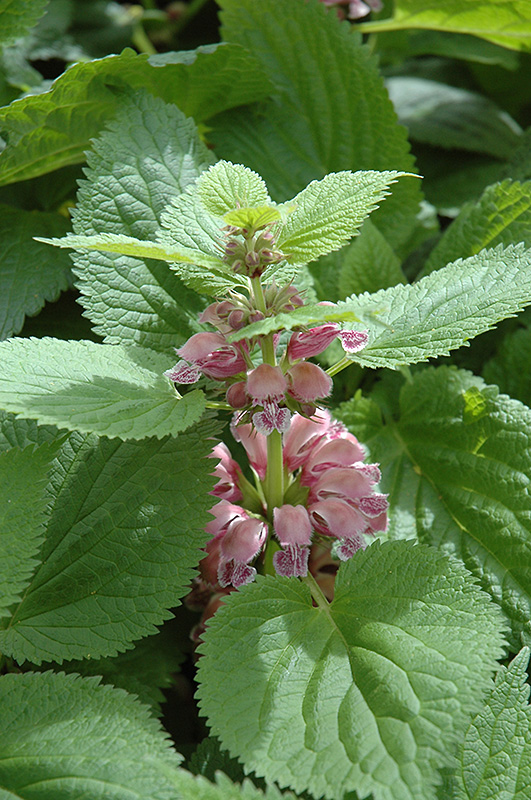Know Before You Go!
Get notified before our plants arrive in stores near you.
Plant Care Library

Silva Giant Dead Nettle flowers
Silva Giant Dead Nettle flowers
(Photo courtesy of NetPS Plant Finder)
Height: 24 inches
Spread: 24 inches
Sunlight:
![]()
![]()
Hardiness Zone: 4a
Other Names: Deadnettle
Description:
A very different Lamium than you might be used to, this is a non-spreading plant that forms a nearly perfect ball; short spikes of pink flowers nestle in the large silver-striped dentate foliage; great for shade and woodland plantings
Ornamental Features
Silva Giant Dead Nettle has masses of beautiful spikes of shell pink flowers from mid spring to early summer, which are most effective when planted in groupings. Its attractive large pointy leaves remain green in color with prominent silver stripes throughout the season.
Landscape Attributes
Silva Giant Dead Nettle is a dense herbaceous perennial with a more or less rounded form. Its relatively coarse texture can be used to stand it apart from other garden plants with finer foliage.
This is a relatively low maintenance plant, and can be pruned at anytime. It is a good choice for attracting butterflies to your yard, but is not particularly attractive to deer who tend to leave it alone in favor of tastier treats. It has no significant negative characteristics.
Silva Giant Dead Nettle is recommended for the following landscape applications;
- Mass Planting
- General Garden Use
- Naturalizing And Woodland Gardens
Planting & Growing
Silva Giant Dead Nettle will grow to be about 24 inches tall at maturity, with a spread of 24 inches. Its foliage tends to remain dense right to the ground, not requiring facer plants in front. It grows at a fast rate, and under ideal conditions can be expected to live for approximately 10 years. As an herbaceous perennial, this plant will usually die back to the crown each winter, and will regrow from the base each spring. Be careful not to disturb the crown in late winter when it may not be readily seen!
This plant does best in partial shade to shade. It is an amazingly adaptable plant, tolerating both dry conditions and even some standing water. It is considered to be drought-tolerant, and thus makes an ideal choice for a low-water garden or xeriscape application. It is not particular as to soil type or pH. It is highly tolerant of urban pollution and will even thrive in inner city environments. This is a selected variety of a species not originally from North America. It can be propagated by division; however, as a cultivated variety, be aware that it may be subject to certain restrictions or prohibitions on propagation.
A NetPS Plant Finder tool
